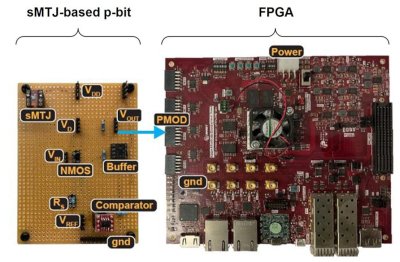Researchers develop a scaled-up spintronic probabilistic computer
Researchers at Tohoku University, the University of Messina and the University of California, Santa Barbara (UCSB) have developed a scaled-up version of a probabilistic computer (p-computer) with stochastic spintronic devices that is suitable for hard computational problems like combinatorial optimization and machine learning.
The constructed heterogeneous p-computer consisting of stochastic magnetic tunnel junction (sMTJ) based probabilistic bit (p-bit) and field-programmable gate array (FPGA). ©Kerem Camsari, Giovanni Finocchio, and Shunsuke Fukami et al.
A p-computer harnesses naturally stochastic building blocks called probabilistic bits (p-bits). Unlike bits in traditional computers, p-bits oscillate between states. A p-computer can operate at room-temperature and acts as a domain-specific computer for a wide variety of applications in machine learning and artificial intelligence. Just like quantum computers try to solve inherently quantum problems in quantum chemistry, p-computers attempt to tackle probabilistic algorithms, widely used for complicated computational problems in combinatorial optimization and sampling.






